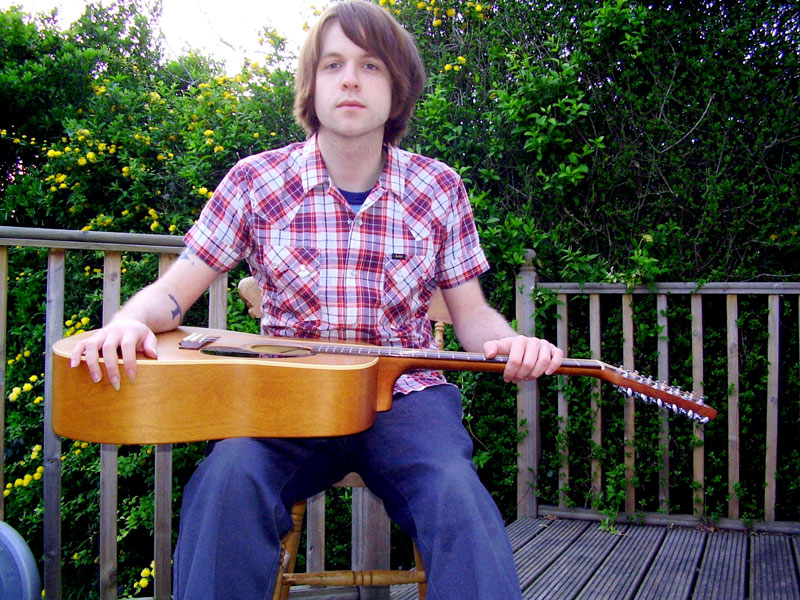James Blackshaw: Falling Into Place

PHOTO COURTESY OF LYNDA SMITH
At 29, London-based composer and twelve-string master James Blackshaw has released nine full-length solo releases, along with numerous one-offs and collaborations that draw equally on American Primitivist guitarists like Leo Kottke and John Fahey and minimalist composers like Philip Glass and Steve Reich. His latest album, All is Falling, is his most fully orchestrated work to date, a beautiful Latin Mass of pinched anxiety and dizzying string figures. Blackshaw spoke to us this week during a break from his current tour with Young God label head Michael Gira‘s Swans.
BRENDON BOUZARD: Do you see All is Falling more as a continuation of or a departure from your earlier releases?
JAMES BLACKSHAW: I don’t know—it’s hard to say, really. I think at the time I made it, it felt like a continuation—a sidestep, in some regards, to the same ideas I’ve been having in the past albums, with previous albums I’ve made. I wanted to try to find a different way of doing things. The album is put together very differently from how I would normally go about putting it together.
BOUZARD: How so?
BLACKSHAW: Typically, when I’ve written albums in the past, it’s with the guitar in mind. And when I’ve added stuff—string instruments, piano, harmonium, glockenspiel, or anything like that—it hasn’t been an afterthought, but it’s been less integral to the making of the album as a whole. This time, I knew I wanted the guitar to be just part of a tapestry—I wanted other instruments to play a much bigger part, so I took a lot more time before recording working out arrangements for other instruments, and going through it with the group of musicians I’m working with and scoring.
BOUZARD: The change in process seems to have resulted in a more apocalyptic sound—there’s ominous counting on Part Six, and the music crescendos into what sounds like air-raid sirens on Part Seven. What state of mind went into this record?
BLACKSHAW: In retrospect, I think it’s a darker album, but it didn’t necessarily feel like that was what I was doing at the time. I’ve long been obsessed with the apocalypse and the post-apocalypse in science fiction. It’s almost like a reverse wonderland. There’s a fear of the unknown, but I hadn’t thought of the album in those terms.
BOUZARD: A lot of your album titles come from literature: The Glass Bead Game [from Hermann Hesse]; the compilation you curated, The Garden of Forking Paths [from Jorge Luis Borges]. What role does literature play in guiding you as a composer?
BLACKSHAW: I don’t really think of a narrative or a theme when I’m writing music, so I wouldn’t say that books I’ve read necessarily play a direct or overt influence on what I’m thinking. Sometimes what I’m reading or watching—film is a big part of my life—captures my mood more than anything else. And music, of course, but music is what I’m making, so oddly enough, when I’m writing, I tend not to listen to an awful lot.
BOUZARD: Are there any particular films or filmmakers who have been an influence?
BLACKSHAW: Werner Herzog is the biggest influence—his films capture something very difficult to articulate elsewhere. I like that they’re not very black-and-white. In his documentaries, people and places—landscapes, even—take on this very gray quality. They can be very beautiful, but very oppressive. Nature is very oppressive, but it’s also very pretty to look at. And he seems to approach his characters in a similar way: they can be incredibly ambitious and do wondrously amazing things, but they’re often very close to the edge. There’s a lot of him in the work. But I like a lot other stuff—’60s Japanese movies. I like a lot of trash, as well. The things that influence me aren’t necessarily intelligent or highbrow. I try to draw on lots of different influences, but Werner Herzog is definitely the strongest.
BOUZARD: Have you considered scoring for film?
BLACKSHAW: I’d love to. It’s an opportunity that’s never come up. It’d have to be something that really interested me.
BOUZARD: Whenever I see people talk about your music, people always make reference to Takoma Records and also to minimalist composers like Terry Riley and Steve Reich. But before you started composing for twelve-string, you were in a punk band. What influence do you think that’s had on you?
BLACKSHAW: Musically, very little. A lot of it doesn’t hold up for me or hold much interest, but I think, for example, the hardcore scene in San Diego during the early to late ‘90s is still somewhat interesting and is a little bit more intelligent—it has a bit of a No Wave influence. When I was younger, I hadn’t necessarily heard of bands like Teenage Jesus and The Jerks and DNA and stuff like that—I like that stuff a lot. I think one thing that I still carry from my teenage years is that I still don’t place a great emphasis on virtuosity, which kinda makes me laugh. Some people think I’m a really good guitar player—I don’t necessarily think I am. I developed as much technique as I needed, and maybe I pushed it a slightly different direction than some people have thought of, but I like the idea of anybody being able to make music. Virtuosity and technique not having a stranglehold over people’s creativity. I never had lessons when I was a kid. The idea of just buying an instrument and finding your way around that: “Oh, you wanna form a band?”
ALL IS FALLING IS OUT NOW (YOUNG GOD RECORDS). JAMES BLACKSHAW IS CURRENTLY ON A WORLD TOUR WITH SWANS.






